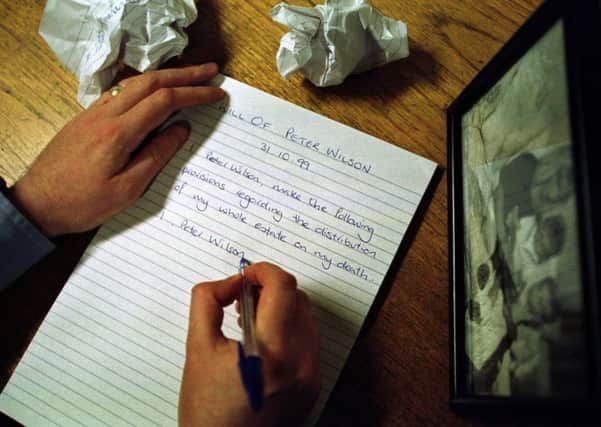Don’t put off writing your will


New Year, new resolve. Or so we like to think. A new year has always been a time for reforming old habits and achieving new goals.
Of course, the success in fulfilling any resolution depends, to a large extent, on the nature of the resolution and the determination of the person making it.
Advertisement
Hide AdAdvertisement
Hide AdIf you struggle to keep your resolutions, why not ditch the trivial and frivolous and make writing your will your top resolution for 2014.
As much as we might wish to ignore it, we all know we are going to die one day. For this reason alone, most of us know we should write a will.
However, there are many other good reasons, which should hopefully strengthen that resolve further and ensure that this resolution, at least, will be the one achieved this year.
Making a will gives you certainty in allowing you to control who will inherit what. This includes the opportunity to leave legacies to people or organisations outside the family such as a valued friend or favoured charity.
Without a will (intestacy), the law sets out certain rules as to how the estate should be divided. These rules dictate the distribution of the estate to spouses, civil partners and children.
This can mean that in certain cases, the amounts laid down by the law will not exhaust the total estate left or, alternatively, that the spouse or civil partner will scoop the lot, leaving nothing for the children. In addition, complicated rules apply to cohabitees requiring them to make a claim on an estate within a set period of time.
Without a will, the law determines not only who inherits but also the amounts of that inheritance.
A will also enables you to appoint Executors who are responsible for carrying out your wishes and ensuring your estate is wound up in a timely and efficient manner.
Advertisement
Hide AdAdvertisement
Hide AdWithout a will, Executors are appointed by the court (usually your next of kin), an appointment which might not necessarily meet with your total approval.
Anyone who has young children should make a will to ensure their wishes for guardians are recorded rather than leaving such a decision to relatives or the courts.
Again, making a will provides the perfect opportunity to choose someone who will offer the best care for any children in the event of them being left without either parent.
A will can also provide the perfect vehicle for some tax planning. By distributing assets in a tax efficient way or by creating a trust within a will, they can sometimes be protected and, at the same time, inheritance tax be reduced.
If you run a family business, a will can provide an opportunity to ensure that the business lives on long after your death.
This can avoid costly litigation for beneficiaries trying to clarify what your intentions were for the business and who has rights to what, hopefully keeping power struggles to a minimum.
It is often acknowledged that we have no say in how we enter the world but that we can be in total control of the way we mark our exit.
It seems strange therefore that many do not take the opportunity to dictate their wishes in this regard and to do some “funeral planning” for their own demise.
Advertisement
Hide AdAdvertisement
Hide AdA will is the perfect place to lay out exactly what you have in mind, especially if there are religious or non-religious requirements or family traditions to uphold. Unless you write it down your wishes may not be known or respected and disagreements amongst family might then arise.
Not having a will can mean lengthy delays in winding up your estate, which could leave those closest to you in a difficult financial position, in some cases for years.
Family lives are more complicated than ever now, with many couples divorcing, marrying for a second time, with second families, or simply living together as cohabitees. In such cases, it has never been more important to have a suitable will in place.
In addition, it is also essential to review a will annually, particularly when major life changes such as births, marriages and divorces occur, to ensure that it reflects your wishes completely at all times.
If nothing else, by planning ahead and making a will you will have some peace of mind in the knowledge that, when the time comes, you will have done all that you could to make life as simple and as straightforward as possible for those who you have left behind.
Making a will is really something you do for the people you care about. It is a selfless act. When seen in this context, it not only seems a resolution worth making, but one worth achieving. • Dianne Paterson is a partner in Russel + Aitken LLP www.russelaitken.com